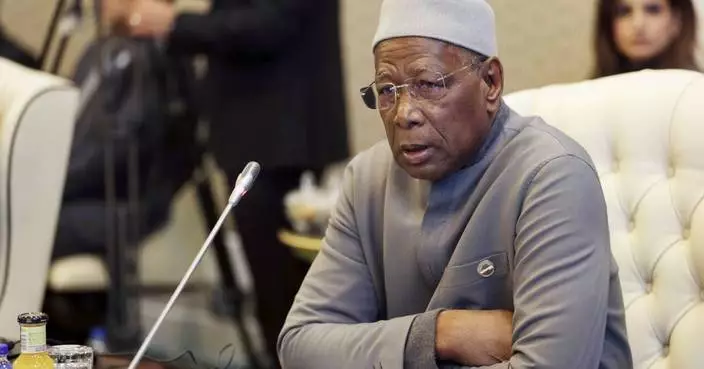The top diplomat in eastern Libya says the shutdown of vital oil facilities in the country would come to an end “when Libyans are guaranteed of the fair distribution of their resources.”
The closures came about when powerful tribal groups loyal to Libyan military commander Khalifa Hifter in January seized several large export terminals along Libya’s eastern coast, as well as southern oil fields. Hifter is allied with the interim government based in the east.
Click to Gallery
The top diplomat in eastern Libya says the shutdown of vital oil facilities in the country would come to an end “when Libyans are guaranteed of the fair distribution of their resources.”
Lahouij spoke to the AP on Friday while on a trip to Russia lasting several days. He attended a conference on the Middle East hosted by the Moscow-based think tank the Valdai Discussion Club.
The Tripoli government controls only a shrinking corner of the country’s west. But it enjoys a different advantage: its control over Libya’s Central Bank, which holds the country’s oil revenue.
Lahouij accused the Tripoli-based government of using oil resources to pay for “mercenaries and foreign pilots” who fight on its side against Hifter forces.
The National Oil Corporation said losses from the oil closures have reached more than $1.85 billion as of Thursday. The daily oil production has since the closure fallen to 122,424 barrels a day from about 1.2 million.
“These resources are protected by our government, and by its army," Abdelhadi Lahouij, foreign minister of the interim government told The Associated Press. “We pay the money for the police to guard the oil facilities, and protect the foreigners who are working in the oil facilities.”
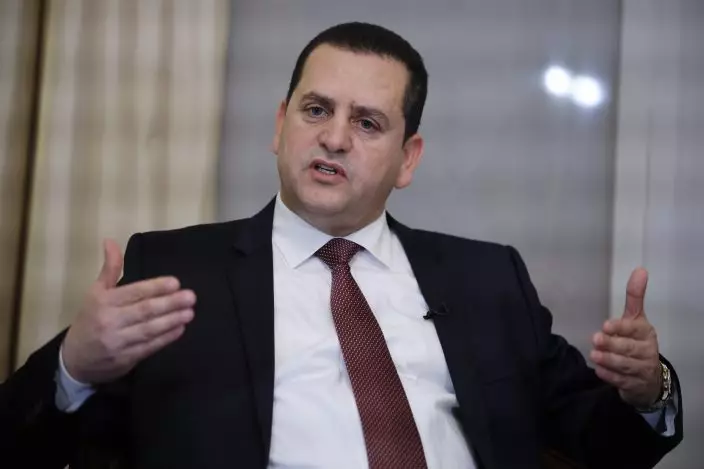
In this photo taken on Friday, Feb. 21, 2020, Abdul Hadi Al-Hweij, the Foreign Minister for the east-based Libyan authorities led by General Khalifa Hifter speaks interview with the Associated Press in Moscow, Russia. (AP PhotoAlexander Zemlianichenko)
Lahouij spoke to the AP on Friday while on a trip to Russia lasting several days. He attended a conference on the Middle East hosted by the Moscow-based think tank the Valdai Discussion Club.
Hifter’s forces, which control the eastern and much of the southern part of the country, launched an offensive in April to capture Libya’s capital, Tripoli, clashing with an array of militias loosely allied with a U.N.-supported but weak government based there.
The closure of the oil facilities was seen as part of Hifter’s efforts to capture Tripoli and punish his adversaries there for sealing security and maritime agreements with Turkey, opening doors for unlimited military support from Ankara. Oil is the main source of revenue in Libya.
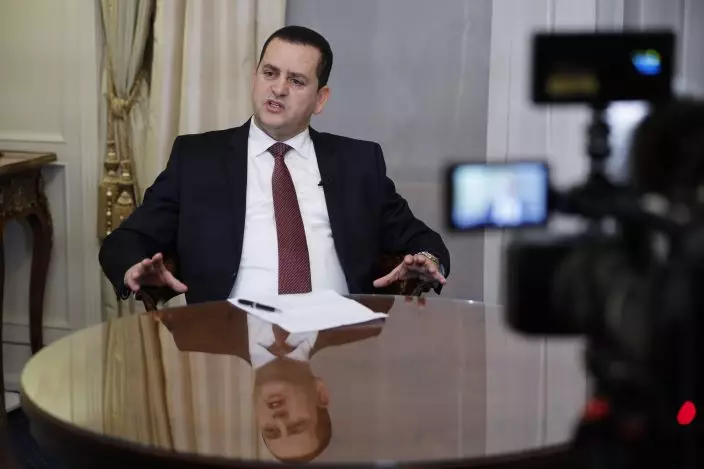
In this photo taken on Friday, Feb. 21, 2020, Abdul Hadi Al-Hweij, the Foreign Minister for the east-based Libyan authorities led by General Khalifa Hifter speaks interview with the Associated Press in Moscow, Russia. (AP PhotoAlexander Zemlianichenko)
The Tripoli government controls only a shrinking corner of the country’s west. But it enjoys a different advantage: its control over Libya’s Central Bank, which holds the country’s oil revenue.
The opaque finances of the bank has drawn sharp criticism. Hifter’s forces accuse the bank of diverting oil assets to pay Syrian mercenaries to defend the capital.
Libya’s National Oil Corporation, which dominates Libya’s critical oil industry and is based in Tripoli, has also called repeatedly for increased transparency.
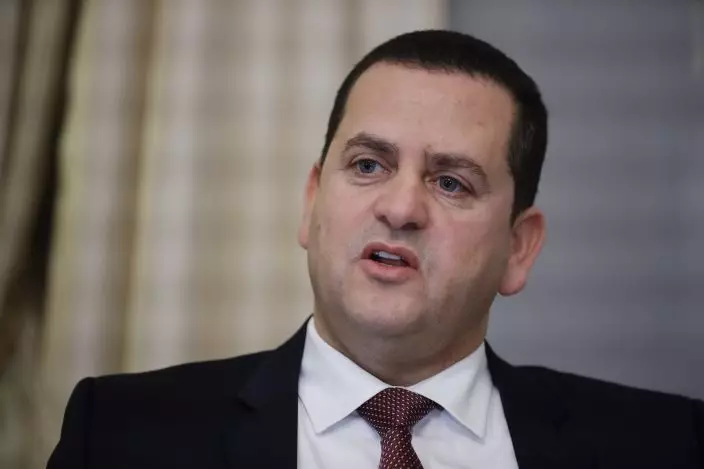
In this photo taken on Friday, Feb. 21, 2020, Abdul Hadi Al-Hweij, the Foreign Minister for the east-based Libyan authorities led by General Khalifa Hifter speaks interview with the Associated Press in Moscow, Russia. (AP PhotoAlexander Zemlianichenko)
Lahouij accused the Tripoli-based government of using oil resources to pay for “mercenaries and foreign pilots” who fight on its side against Hifter forces.
Turkey, which backs the Tripoli-based administration, has sent hundreds of Syrian fighters including militants affiliated with groups such as al-Qaida and the Islamic State group to fight against Hifter's forces.
“When we are guaranteed a fair distribution of resources, this problem will come an end and the oil flow will return as it was,” he said.
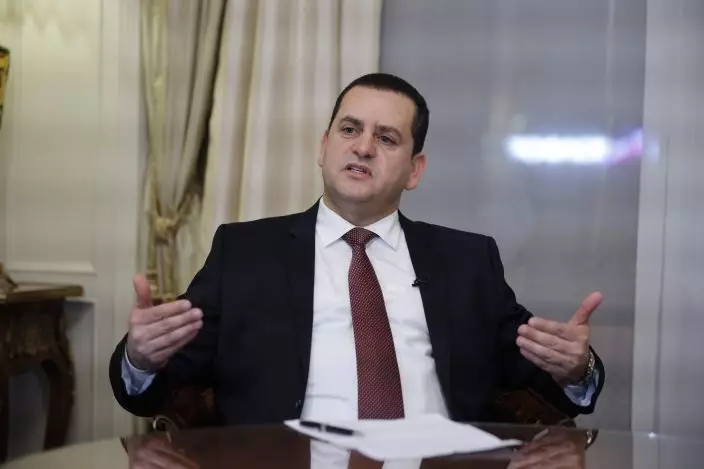
In this photo taken on Friday, Feb. 21, 2020, Abdul Hadi Al-Hweij, the Foreign Minister for the east-based Libyan authorities led by General Khalifa Hifter speaks interview with the Associated Press in Moscow, Russia. (AP PhotoAlexander Zemlianichenko)
The National Oil Corporation said losses from the oil closures have reached more than $1.85 billion as of Thursday. The daily oil production has since the closure fallen to 122,424 barrels a day from about 1.2 million.
Libya has the ninth largest known oil reserves in the world and the biggest oil reserves in Africa.
The Tripoli authorities and U.S. officials have also accused Hifter of relying on hundreds of Russian mercenaries. Sudanese armed groups from the Darfur region recently joined the fighting on both sides, according to a report by U.N. experts.
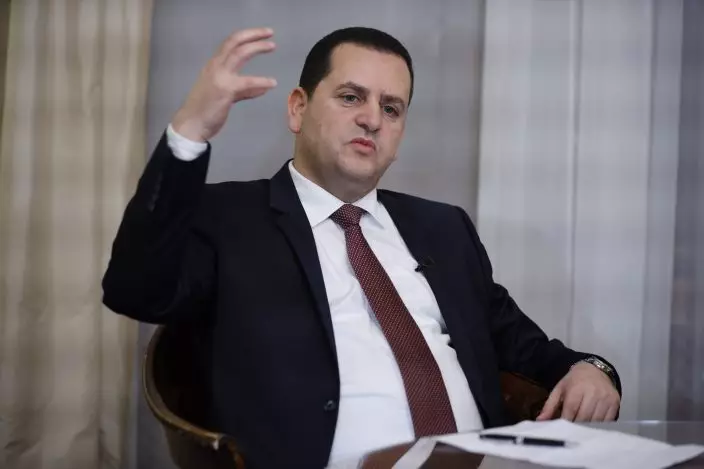
In this photo taken on Friday, Feb. 21, 2020, Abdul Hadi Al-Hweij, the Foreign Minister for the east-based Libyan authorities led by General Khalifa Hifter speaks interview with the Associated Press in Moscow, Russia. (AP PhotoAlexander Zemlianichenko)
Lahouij denied that Russia has provided military assistance to Hifter’s forces. “There is no Russian military aid for... our Libyan army,” he said.
Forced to hide her true self, Joe Horras’ transgender daughter struggled with depression and anxiety until three years ago, when she began to take medication to block the onset of puberty. The gender-affirming treatment helped the now-16-year-old find happiness again, her father said.
A decision by the U.S. Supreme Court late Monday allowing Idaho to enforce its ban on such care for minors could jeopardize her wellbeing once again. Horras is scrambling to figure out next steps and is considering leaving Idaho, where he's lived his whole life, to move to another state.
"It would be devastating for her," Horras, who lives in Boise, told The Associated Press. “If she doesn’t have access to that, it will damage her mental health."
Horras is among the Idaho parents desperate to find solutions after their trans children lost access to the gender-affirming care they were receiving. The U.S. Supreme Court's decision allows the state to put in place a 2023 law that subjects physicians to up to 10 years in prison if they provide hormones, puberty blockers or other gender-affirming care to people under age 18. A federal judge in Idaho had previously blocked the law in its entirety.
The ruling will hold while lawsuits against the law proceed through the lower courts, although the two transgender teens who sued to challenge the law will still be able to obtain care.
At least 24 states have adopted bans on gender-affirming care for minors in recent years, and most of them face legal challenges. Twenty of those states besides Idaho are currently enforcing the bans.
Monday’s ruling was the first time the U.S. Supreme Court waded into the issue. The court’s 6-3 ruling steered clear of whether the ban itself is constitutional. Instead, the justices went deep into whether it’s appropriate to put enforcement of a law on hold for everyone, or just those who sue over it, while it works its way through the courts.
In his concurring opinion, Justice Neil Gorsuch said “lower courts would be wise to take heed” and limit use of “universal injunctions” blocking all enforcement of laws that face legal challenges. In a dissent, Justice Ketanji Brown Jackson said the court should not decide the fate of those actions without reading legal briefs and hearing arguments on the issue.
Rights groups in Idaho are supporting families to make sure they're aware the measure has taken effect. The American Civil Liberties Union of Idaho said it plans to hold a virtual event over Zoom with licensed counselors and legal experts to help people process the shock and answer any questions they may have about the law.
“Yesterday was really just an outpouring of fear, questions, people trying to figure out how this is going to affect them personally,” said Jenna Damron, the group's advocacy fellow. “Getting information out quickly that is accurate is kind of our first priority.”
Paul Southwick, legal director for ACLU of Idaho, said the group wants families to know what their options are.
“Gender-affirming medical care is now immediately illegal for minors in the state of Idaho. However, care remains legal for adults, and it’s also legal for minors to seek gender-affirming medical care out of state,” he said.
In Boise, Horras' 16-year-old daughter wears an estrogen patch and receives estrogen injections every six months. Her last shot was in December and Horras now has two months to find a new out-of-state provider who can continue administering the medication. The situation has left him feeling scared, he said, and angry toward the state politicians who passed the law last year.
“It's cruel,” he said.
Advocates, meanwhile, worry that lower-income families won't be able to afford to travel across state lines for care. Arya Shae Walker, a transgender man and activist in the small city of Twin Falls in rural southern Idaho, said he was concerned that people would alter the doses of their current prescriptions in order to make them last longer. His advocacy group has already taken down information on its website on gender-affirming care providers for young people in the area out of concern of potential legal consequences.
The broader issue of bans on gender-affirming care for minors could eventually be before the U.S. Supreme Court again. Last year, a ban on gender-affirming care for minors in Arkansas was shot down by a federal judge, while those in Kentucky and Tennessee were allowed to be enforced by an appeals court after being put on hold by lower-court judges. Montana’s law is not being enforced because of a ruling from a state judge.
Laws barring transgender youth from playing on sports teams that align with their gender identity are also being challenged across the country. An appeals court on Tuesday ruled that West Virginia’s transgender sports ban violates the rights of a teen athlete under Title IX, the federal civil rights law that prohibits sex-based discrimination in schools. Hours later, an Ohio law that bars transgender girls from girls scholastic sports competitions was put on hold by a judge. Set to take effect next week, the law also bans gender-affirming care for transgender youth.
Those who support the bans say they want to protect children and have concerns about the treatments themselves.
Gender-affirming care for youth is supported by major medical organizations, including the American Medical Association, the American Academy of Pediatrics and the American Psychiatric Association. However, England is limiting the ability of people younger than 16 to begin a medical gender transition.
The National Health Service England recently cemented a policy first issued on an interim basis almost a year ago that sets a minimum age at which puberty blockers can be started, along with other requirements. NHS England says there is not enough evidence about their long-term effects, including “sexual, cognitive or broader developmental outcomes.”
Medical professionals define gender dysphoria as psychological distress experienced by those whose gender expression does not match their gender identity. Experts say gender-affirming therapy can lead to lower rates of depression, suicidal thoughts and suicide attempts among transgender people.
Chelsea Gaona-Lincoln, executive director of Idaho-based advocacy group Add The Words, said she's anticipating “a pretty horrendous ripple effect.” But seeing her community uniting in support has given her a glimmer of hope.
“There are people coming together, and it’s so important, for especially our youth, to feel seen and affirmed as they are," she said.
Southwick, the legal director of ACLU of Idaho, said the 9th U.S. Circuit Court of Appeals is expected to hold a hearing this summer on its lawsuit challenging the law.
Associated Press writer Geoff Mulvihill in Cherry Hill, New Jersey, contributed.
This story was first published on April 16, 2024. It was updated on April 18, 2024, to make clear that the 20 states enforcing bans on gender-affirming care for minors are in addition to Idaho and all are among the 24 that have passed laws imposing the bans.
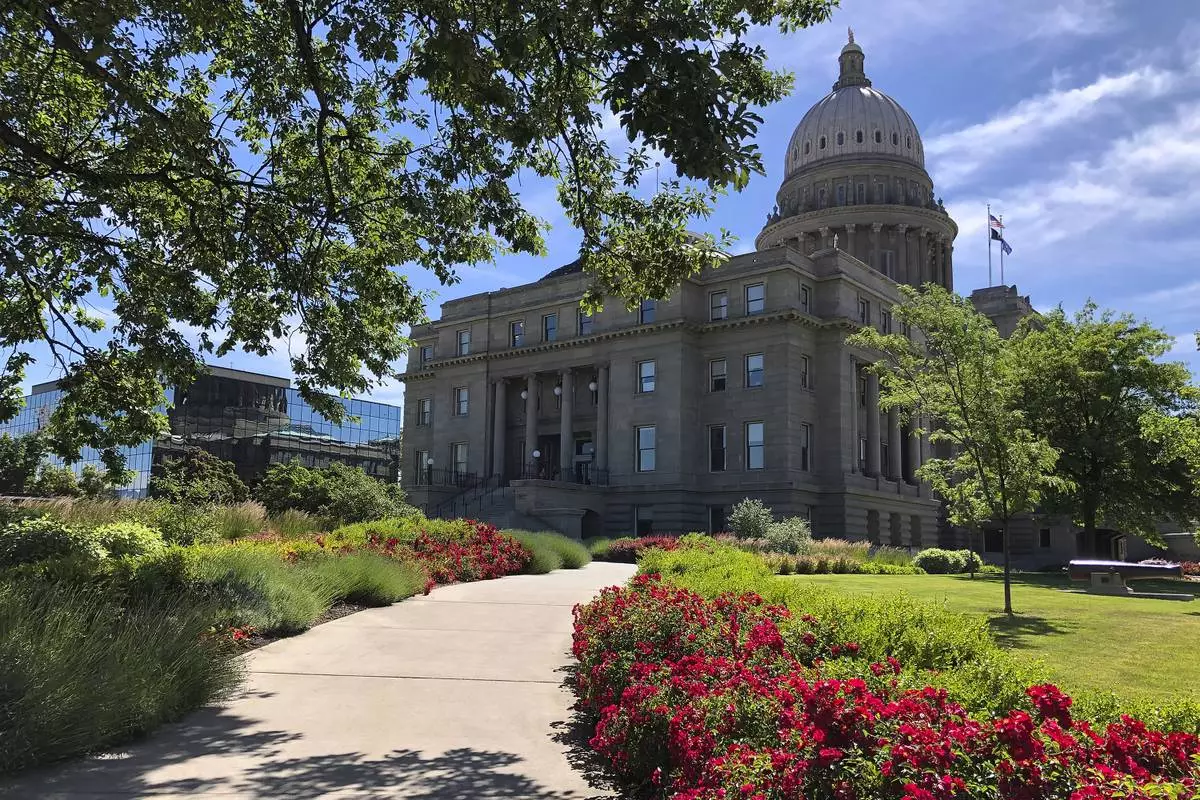
FILE - The Idaho State Capitol in Boise, Idaho, is seen on June 13, 2019. The U.S. Supreme Court's decision on Monday, April 15, 2024, allows the state to put in place a 2023 law that subjects physicians to up to 10 years in prison if they provide hormones, puberty blockers or other gender-affirming care to people under age 18. A federal judge in Idaho had previously blocked the law in its entirety. (AP Photo/Keith Ridler, File)
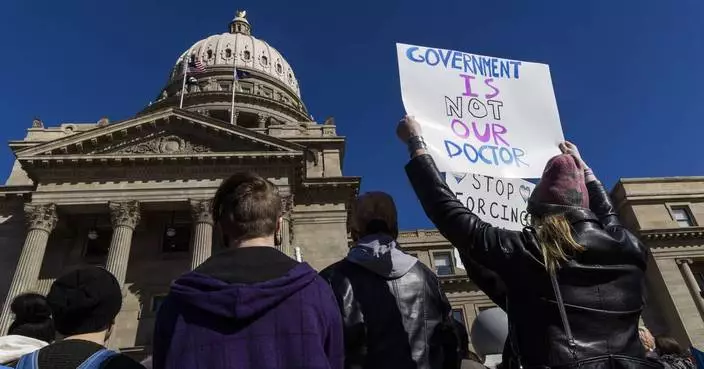
Idaho's ban on youth gender-affirming care has families desperately scrambling for solutions
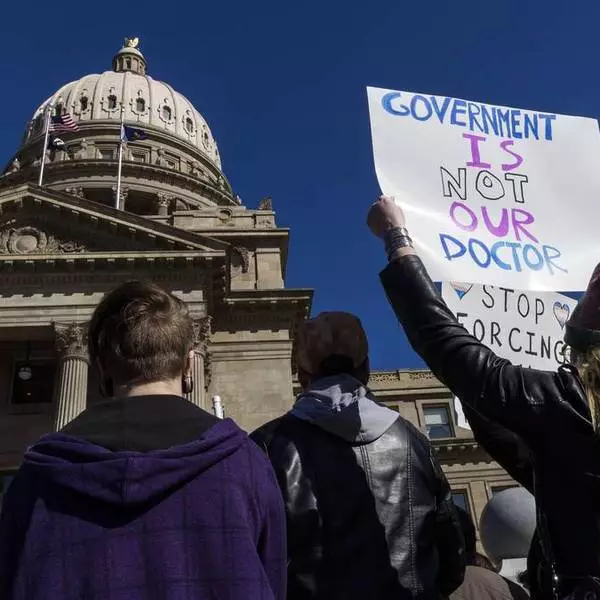
Idaho's ban on youth gender-affirming care has families desperately scrambling for solutions
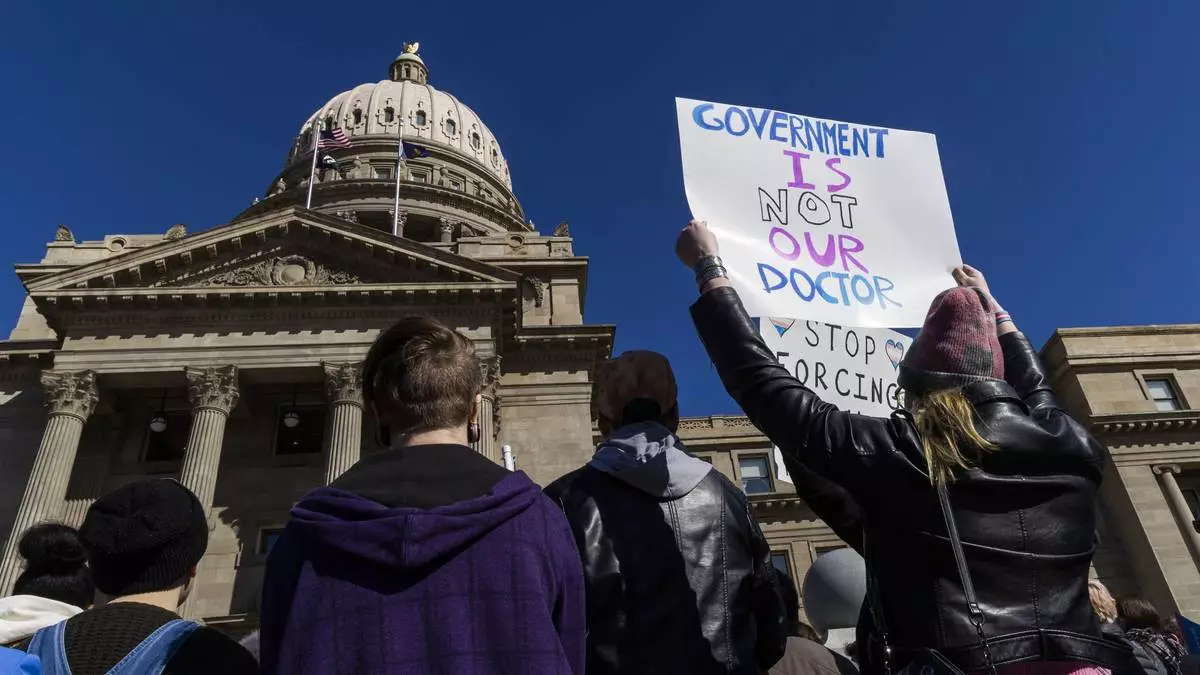
FILE - People gather in front of the Idaho Statehouse in opposition to anti-transgender legislation moving through an Idaho Republican congress, Friday, Feb. 24, 2023, in Boise, Idaho. The U.S. Supreme Court's decision on Monday, April 15, 2024, allows the state to put in place a 2023 law that subjects physicians to up to 10 years in prison if they provide hormones, puberty blockers or other gender-affirming care to people under age 18. A federal judge in Idaho had previously blocked the law in its entirety. (Darin Oswald/Idaho Statesman via AP, File)












